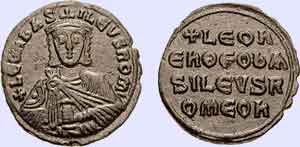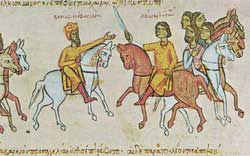|
|
The Byzantines considered themselves the true Romans. This follis by Leo VI bears the Byzantine Emperors' offcial title, BASILEVS ROMEON, Emperor of the Romans. [Source] Leo VI "the Wise" or "the Philosopher" (Greek: Λέων ΣΤ΄, Leōn VI), (September 19, 866 – May 11, 912) was Byzantine emperor from 886 to 912 during one of the most brilliant periods of the state's history. Background Leo was born to Eudokia Ingerina who was at the time mistress of Emperor Michael III and wife of his Caesar Basil. Which of the two men was his father is uncertain. He was officially acknowledged by Basil as his son, but he apparently regarded Leo as Michael's son-although Basil only had eyes for his son Constantine, which may have worsened Leo and his Basil's relations and contributed to Basil's belief in Leo's illegitimacy. On the night of September 23-September 24, 867, Michael was assassinated by Basil who succeeded him as Emperor Basil I. As the second eldest son of the Emperor, Leo was associated on the throne in 870 and became the direct heir on the death of his older half-brother Constantine in 879. However, he and his father hated each other and Basil had almost had Leo blinded as a teenager. On August 29, 886, Basil died in a hunting accident, though he claimed on his deathbed that there was an assassination attempt in which Leo was possibly involved. Leo's sobriquet may be explained by the facts that he "was less ignorant than the greater part of his contemporaries in church and state, that his education had been directed by the learned Photios, and that several books of profane and ecclesiastical science were composed by the pen, or in the name, of the imperial philosopher" (Edward Gibbon). Domestic Policy One of the first actions of Leo VI after his succession was the reburial of Michael III in Constantinople, which may have contributed to the suspicion that he was Michael's son. Seeking political reconciliation, the new emperor secured the support of the officials in the capital, and surrounded himself with bureaucrats like Stylianos Zoutzes and the eunuch Samonas. His attempts to control the great aristocratic families (e.g., the Phokadai and the Doukai) occasionally led to serious conflicts. Leo also attempted to control the church through his appointments to the patriarchate. He dismissed the Patriarch Photios of Constantinople, who had been his tutor, and replaced him with his own 16-year old brother Stephen in December 886. On Stephen's death in 893, Leo replaced him with Zaoutzes' nominee, Antony II Kaleuas, who died in 901. Leo then promoted his own imperial secretary (mystikos) Nicholas, but replaced him with his spiritual father Euthymios in 907. Leo completed work on the Basilica, the Greek translation and update of the law code issued by Justinian I, which had been started during the reign of Basil. International Policy Leo VI was not as successful in battle as Basil had been. In indulging his chief counselor Stylianos Zaoutzes, Leo provoked a war with Simeon I of Bulgaria in 894, but was defeated. Bribing the Magyars to attack the Bulgarians from the north, Leo scored an indirect success in 895. However, deprived of his new allies, he lost the major Battle of Boulgarophygon in 896 and had to make the required commercial concessions and to pay annual tribute. The Emirate of Sicily took Taormina, the last Byzantine outpost on the island of Sicily, in 902. In 904 the renegade Leo of Tripolis sacked Thessalonica with his Muslim pirates (an event described in The Capture of Thessalonica by John Kameniates). In 907 Constantinople was attacked by the Kievan Rus' under Oleg of Novgorod, who was seeking favourable trading rights with the empire. Leo paid them off, but they attacked again in 911, and a trade treaty was finally signed. The admiral Himerios, a relative of Leo's last wife, Zoe Karbonopsina scored some successes against the Muslim fleets in 908 and raided Cyprus in 910, but in 912 was soundly defeated in his attempt to conquer Crete. Fourth marriage dispute LLeo VI caused a major scandal with his numerous marriages which failed to produce a legitimate heir to the throne. His first wife, whom Basil had forced him to marry, died in 897, and he married Zoe Zaoutzaina, the daughter of his adviser Stylianos Zaoutzes, though she died as well in 899. Upon this marriage Leo created the title of basileopatōr ("father of the emperor") for his father-in-law. After Zoe's death a third marriage was technically illegal, but he married again, only to have his third wife die in 901. Instead of marrying a fourth time, which would have been an even greater sin than a third marriage (according to the Patriarch Nicholas Mystikos) Leo took as mistress, Zoe Karbonopsina. He married her only after she had given birth to a son in 905, but incurred the opposition of the patriarch. Replacing Nicholas Mystikos with Euthymios, Leo got his marriage recognized by the church, but openend up a conflict within it and allowed new grounds for papal intervention into Byzantine affairs when he sought and obtained papal consent. Succession
Basil I and his son Leo. [Source] The future Constantine VII was the illegitimate son born before Leo's uncanonical fourth marriage to Zoe Karbonopsina. To strengthen his son's position as heir, Leo had him crowned as co-emperor on May 15, 908, when he was only two years old. Leo VI died on May 2, 912. He was succeeded by his younger brother Alexander, who had reigned as emperor alongside his father and brother since 879. Legends According to Bishop Liutprand of Cremona, and probably inspired by stories about the caliph Harun al-Rashid, Leo would sometimes disguise himself and look for injustice or corruption. On one account, he was even captured by the city guards during one of his investigations. He wanted to know if the city patrol was doing its job appropriately. He was walking alone, disguised, late in the evening without any documentation. He bribed two patrols for 12 nomismas, and moved on. However, the third city patrol arrested him. When a terrified guardian recognized the jailed ruler in the morning, the arresting officer was rewarded for doing his duty, while the other patrols were dismissed and punished severely. References The Oxford Dictionary of Byzantium, Oxford University Press, 1991. Byzantine Emperor Retrieved from "http://en.wikipedia.org/I"
 |
|
|||||||||||||||||

